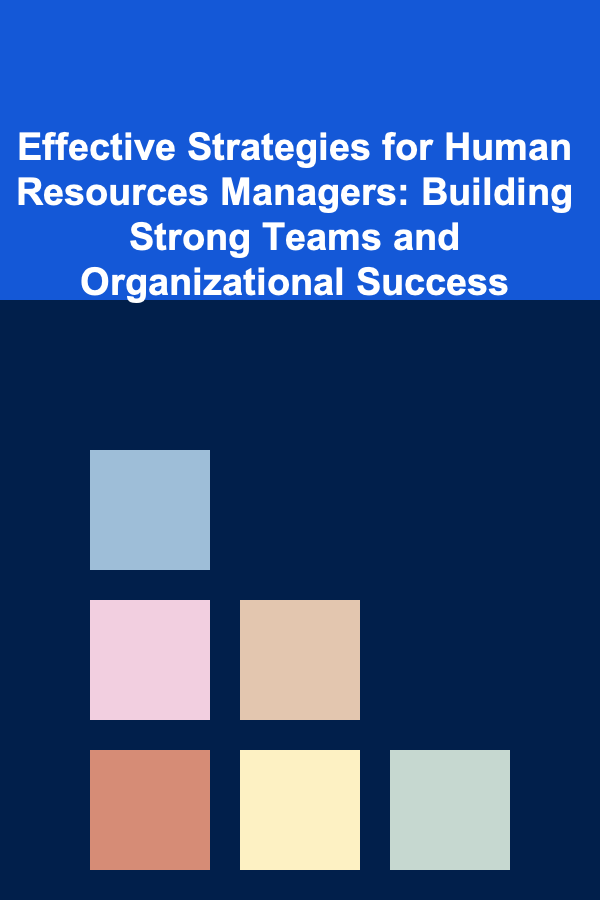
Effective Strategies for Human Resources Managers: Building Strong Teams and Organizational Success
ebook include PDF & Audio bundle (Micro Guide)
$12.99$7.99
Limited Time Offer! Order within the next:

Human Resources (HR) managers play a pivotal role in shaping the success of an organization. They are the architects of company culture, the mediators of conflict, and the strategists behind building high-performing teams. As the workplace environment continues to evolve, HR managers must adopt innovative approaches to address challenges and foster an environment of growth, collaboration, and productivity. This actionable guide explores key strategies HR managers can implement to build strong teams and drive organizational success.
Aligning HR Practices with Organizational Goals
An HR strategy must be tightly aligned with the overarching goals of the organization. This alignment ensures that HR initiatives support not only talent acquisition but also long-term growth, culture building, and operational efficiency.
Understanding Organizational Needs
Before implementing any HR strategy, it's crucial to fully understand the organization's goals, vision, and current challenges. Regular meetings with leadership and other key stakeholders will provide insight into the company's short-term and long-term objectives. This information can guide HR initiatives, whether they relate to talent development, workforce planning, or performance management.
For instance, if an organization aims to expand into new markets, HR might focus on recruiting individuals with international experience or language skills. If the goal is to improve innovation, HR can focus on creating a culture that encourages creative thinking and collaboration.
Integrating HR into Business Strategy
HR should no longer be seen as just a support function, but rather as a key player in shaping business strategy. By strategically contributing to decisions on workforce planning, organizational design, and employee development, HR managers help ensure that talent management is closely aligned with the company's evolving needs.
Conducting Regular Workforce Audits
Workforce audits involve assessing the skills, competencies, and capabilities of the existing workforce to identify any gaps that may prevent the organization from achieving its objectives. By conducting these audits regularly, HR managers can take proactive steps to fill these gaps through recruitment, training, or internal mobility programs.
Effective Recruitment and Talent Acquisition
The foundation of a strong team lies in effective recruitment. Without the right talent, no organization can achieve its desired outcomes. HR managers must develop a systematic approach to recruitment that prioritizes both skills and cultural fit.
Defining Clear Job Descriptions and Expectations
Recruitment begins with a clear understanding of the roles and responsibilities that need to be filled. HR managers should collaborate with department heads to create detailed job descriptions that outline key competencies, experiences, and expectations. This ensures that candidates are evaluated against relevant criteria, reducing the likelihood of mis-hires.
Leveraging Technology in Recruitment
In today's digital age, HR managers can leverage technology to streamline the recruitment process. Tools like applicant tracking systems (ATS) and artificial intelligence (AI)-powered hiring platforms help HR teams manage applications more efficiently, reducing manual workload while enhancing candidate experience.
Additionally, social media platforms like LinkedIn, Glassdoor, and Indeed offer vast pools of candidates who can be filtered based on specific criteria. A multi-channel approach ensures that HR managers can tap into diverse talent pools, increasing the chances of finding the right fit for the organization.
Prioritizing Diversity and Inclusion
Building strong teams also means fostering diversity and inclusion. HR managers should actively seek diverse candidates and ensure that recruitment processes are free of bias. This could involve creating diversity-focused job postings, broadening recruitment channels, and implementing unconscious bias training for those involved in hiring.
Diversity in teams is proven to improve creativity, problem-solving, and decision-making. As such, HR managers should make diversity and inclusion a core part of their recruitment strategy.
Fostering a Positive Company Culture
A strong organizational culture is one of the most powerful tools for retaining employees and driving long-term success. HR managers play a key role in shaping and nurturing this culture.
Defining and Communicating Organizational Values
Every successful company has a set of core values that guide its operations. These values should reflect the organization's mission and vision and serve as the foundation for behavior within the workplace. HR managers need to clearly define these values and communicate them consistently across the organization, ensuring that they become ingrained in daily operations.
For instance, if innovation is a core value, HR should implement strategies that promote creative thinking, such as hosting innovation workshops or creating cross-functional teams to tackle challenges. The values should not only be communicated to employees but also embedded in recruitment practices, performance evaluations, and leadership development programs.
Promoting Employee Engagement
Employee engagement is closely tied to productivity and organizational success. When employees feel connected to their work and their company, they are more likely to contribute meaningfully to the organization's objectives. HR managers can improve engagement by providing regular feedback, creating opportunities for skill development, and recognizing achievements.
Surveys and one-on-one meetings can serve as valuable tools to assess employee engagement. Regularly checking in with employees ensures that HR managers can identify issues early and take corrective action to maintain morale.
Implementing Recognition and Rewards Programs
Employees who feel appreciated are more likely to remain motivated and loyal to the organization. HR managers should implement formal recognition programs to celebrate employee achievements, whether through awards, bonuses, or public recognition. These programs not only boost morale but also help reinforce desired behaviors, such as collaboration, leadership, or innovation.
Work-Life Balance Initiatives
A healthy work-life balance is essential for employee well-being and productivity. HR managers can implement flexible working hours, remote work policies, and wellness programs to help employees manage stress and avoid burnout. By providing a supportive work environment, HR managers can improve retention and create a more positive, productive workforce.
Leadership Development and Succession Planning
Great leaders are at the core of high-performing teams. HR managers must ensure that employees have access to leadership development programs and that there is a plan in place for identifying and promoting future leaders.
Identifying High-Potential Employees
Succession planning starts with identifying high-potential employees early. These are individuals who not only excel in their current roles but also show promise in leadership capabilities. HR managers can assess potential leaders by looking at key traits such as problem-solving ability, emotional intelligence, and strategic thinking.
Once high-potential employees are identified, HR managers can tailor development programs to help them gain the skills and experience needed for leadership positions. This may include mentorship programs, leadership training, and opportunities for job rotation across departments.
Providing Ongoing Learning and Development
Leadership development should be seen as an ongoing process, not a one-time event. HR managers should provide continuous learning opportunities for employees at all levels. This could be in the form of formal training, online courses, leadership workshops, or external certifications. Encouraging lifelong learning ensures that leaders are well-equipped to handle changing challenges and lead teams effectively.
Establishing Clear Career Pathways
Employees are more likely to stay with an organization when they see opportunities for growth. HR managers should work with department heads to create clear career paths for employees, outlining the skills and experiences needed to advance within the company. Career development programs also provide a sense of purpose and motivation, encouraging employees to reach their full potential.
Effective Performance Management
Performance management is essential for maintaining high standards and achieving organizational goals. HR managers should implement strategies that focus on continuous feedback, employee development, and goal alignment.
Setting Clear Expectations and Goals
Performance management begins with clear communication about expectations. HR managers should work with employees and their supervisors to establish measurable goals that are aligned with organizational objectives. These goals should be SMART (Specific, Measurable, Achievable, Relevant, and Time-bound), and employees should understand how their individual performance contributes to the larger company vision.
Providing Regular Feedback and Coaching
Instead of waiting for annual performance reviews, HR managers should promote a culture of continuous feedback. Regular feedback, whether positive or constructive, helps employees stay on track and understand areas where they can improve. In addition to feedback, coaching is crucial in helping employees develop their skills and reach their potential.
Addressing Underperformance Proactively
Addressing underperformance early on is crucial to maintaining a high standard of work. HR managers should collaborate with managers to identify performance issues and work together to implement action plans to help employees improve. This could involve additional training, mentorship, or adjustments to the work environment.
Celebrating Achievements
Just as addressing underperformance is important, so is celebrating success. HR managers should ensure that achievements, both big and small, are recognized and rewarded. Celebrating milestones fosters a culture of excellence and motivates employees to continue performing at a high level.
Conclusion
Building strong teams and driving organizational success is not a one-time task but an ongoing process that requires strategic planning, effective execution, and continuous improvement. HR managers are at the heart of this process, ensuring that the right talent is in place, the company culture fosters growth, and leadership development is prioritized.
By aligning HR practices with organizational goals, investing in talent acquisition, fostering a positive company culture, and developing strong leaders, HR managers can create an environment that drives success and innovation. These strategies are not just theoretical---they are actionable steps that can be implemented immediately to build teams that are resilient, motivated, and equipped to achieve greatness.
Reading More From Our Other Websites
- [Home Renovating 101] How to Create a Cozy and Inviting Home Office Space
- [Personal Care Tips 101] How to Combine Acne Treatment Cream with Other Acne Remedies for Better Results
- [Personal Care Tips 101] How to Use Cuticle Oil to Boost Nail Strength and Flexibility
- [Organization Tip 101] How to Make Your Safe Room Comfortable and Livable in an Emergency
- [Organization Tip 101] How to Use Old Furniture for Creative Outdoor Storage
- [Organization Tip 101] How to Set Up a System for Tracking Bills and Expenses
- [Home Cleaning 101] How to Freshen Up Your Home with Natural Air Fresheners
- [Home Budget 101] How to Build an Emergency Fund Within Your Home Budget
- [Home Cleaning 101] How to Clean Your Home Efficiently in Just 30 Minutes a Day
- [Home Rental Property 101] How to Network with Other Landlords for Support

How to Organize Recipes by Cooking Time for Quick Meals
Read More
How to Soundproof Your Apartment Without Losing Space
Read More
How to Use Texture in Home Staging to Add Depth
Read More
10 Tips for Prioritizing Tasks in Your Academic Planner
Read More
10 Tips for Managing Geotechnical Risks on Construction Sites
Read More
10 Tips for Improving Communication with Truck Drivers as a Logistics Coordinator
Read MoreOther Products

How to Organize Recipes by Cooking Time for Quick Meals
Read More
How to Soundproof Your Apartment Without Losing Space
Read More
How to Use Texture in Home Staging to Add Depth
Read More
10 Tips for Prioritizing Tasks in Your Academic Planner
Read More
10 Tips for Managing Geotechnical Risks on Construction Sites
Read More